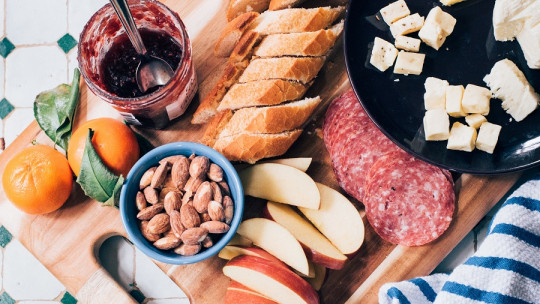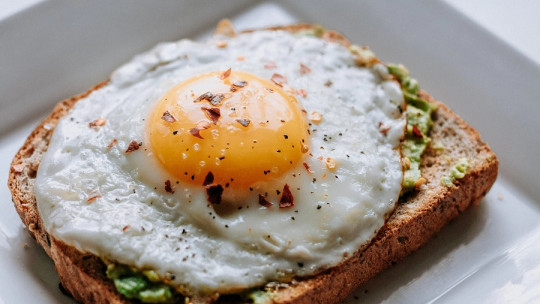Breakfast is the most important meal of the day, since it must provide us with a large amount of energy in order to be able to cope with environmental demands. However, largely due to lack of time, many people limit themselves to grabbing a coffee before rushing off to work.
CSince eating breakfast is important, it is worth asking what a healthy breakfast is like or what it should include Throughout this article we consider some of the main elements that are recommended in the first meal of the day.
Breakfast: why is it important to do it right?
As we all know, breakfast is the first meal of the day, which we generally eat in the morning shortly after waking up. It is also the most relevant food, since it is produced after a relatively long period of time in which no nutrients have been introduced into the body Thus, breakfast is the first contact of the day with the energy that the body needs to function correctly (in fact, the term breakfast itself tells us about the cessation of overnight fasting).
This can cause difficulties and discomforts in the absence of some type of intake, such as problems activating or concentrating, weakness or even dizziness or headaches in some cases, especially during the growth period. Eat a correct and balanced breakfast It usually implies, in addition to largely avoiding the possible appearance of the previous problems, the fact of having a higher level of energy that facilitates functioning during the day, improving mood and reducing stress.
It also gets our metabolism going , in addition to making us less hungry during the day, and making it more difficult to suffer from metabolic problems such as diabetes or heart problems. Likewise, it is usually considered a moment of relaxation and clearing, and in some cases a space for socialization, meeting and meeting between people who live together.
Despite this, it is common for many adults to skip it or reduce it to a minimum, or not do it in a way that incorporates everything necessary to be truly healthy. But what is a healthy breakfast like?
What should healthy and balanced breakfasts include?
We will understand a truly healthy breakfast as one that contains sufficient amount of fiber, carbohydrates, proteins and lipids in an adequate proportion , considering that it should represent at least around 25% of daily calories. In this sense, it is important to keep in mind that it is not only important to incorporate foods that provide these types of nutrients, but also to find a balance point in which they do not appear in excess either.
That said, it should be noted that although most of us generally have similar needs, each person is different and it is possible that what is healthy and balanced for one person is not for another, or even that certain foods do not feel good. or should be avoided by certain types of population (for example in the case of food allergies, intolerances or various medical problems).
Below we will see the elements that most experts tend to agree in considering appropriate and necessary when preparing healthy breakfasts.
1. Dairy
One of the products that is usually given the most importance. Generally the first idea that comes to mind is a bowl of milk, but You can also opt for other elements such as cheese or yogurt In this sense, one of the healthiest alternatives is kefir.
2. Cereals
It is important to introduce, especially in the first moments of the day, foods rich in carbohydrates, since they provide us with a large amount of energy Among them we can find the consumption of one or two slices of bread and/or cereals. It is also recommended that they are not sugary or that, in the case of bread, they be whole wheat or made from elements such as rye. Of course, we must try not to engage in abusive consumption either.
3. Protein source
Another of the essential elements that is relevant to introduce into healthy breakfasts is proteins, which They help us repair and rebuild our body’s cells and keep them functioning That is why it is advisable to introduce products rich in protein, whether vegetable or animal. A classic of many cuisines that is very healthy is the egg, as well as ham (whether sweet or serrano).
4. Fruit
Another of the most frequent elements in a healthy breakfast is the presence of at least one piece of fruit. Any type of fruit can be recommended, some of the most common in our society being orange (citrus fruits are highly recommended), apple or banana. These are usually healthy and digestive foods as well as rich in natural sugars.
Another very common option, although not so recommended (since some of the beneficial properties of the fruit are lost, such as those for the skin) is to drink a juice. If you choose this alternative, you must bear in mind that sometimes Consuming it together with milk can cause some discomfort , and that it should not be abused, as it contains a large amount of sugar. A final option is to use jams, although they tend to be highly sugary.
5. Healthy fats
In addition to the above foods, it may be of interest to introduce products rich in good fats at breakfast: unsaturated, monounsaturated or polyunsaturated fats. Among some foods that include this type of fats we can find nuts or elements like avocado In addition, these foods can be easily mixed with dairy products such as yogurt or items such as bread, or even integrated into a small salad.
To avoid
We have seen the main elements that are part of the healthiest and most balanced breakfasts, but we also need to take into account that Some foods should be avoided or at least restricted as they are unnecessary and excessive and can generate swelling.
Among them, processed and refined products stand out, with special relevance for carbohydrates and sugars. In this sense, it is advisable to avoid industrial pastries or excess sugar, as well as the use of products that are as natural as possible and, if possible, whole grain (as in the case of bread).
Fried foods should be avoided If you use juice, it is much more advisable to make it at home, since the buyer usually has a high amount of sugar. Regarding butter and margarine or the use of jams, although they are usually common in our breakfast, the truth is that they are not recommended, given that while the former are usually made up of saturated fats, the latter have massive amounts of sugar. Soft drinks are also not recommended.









